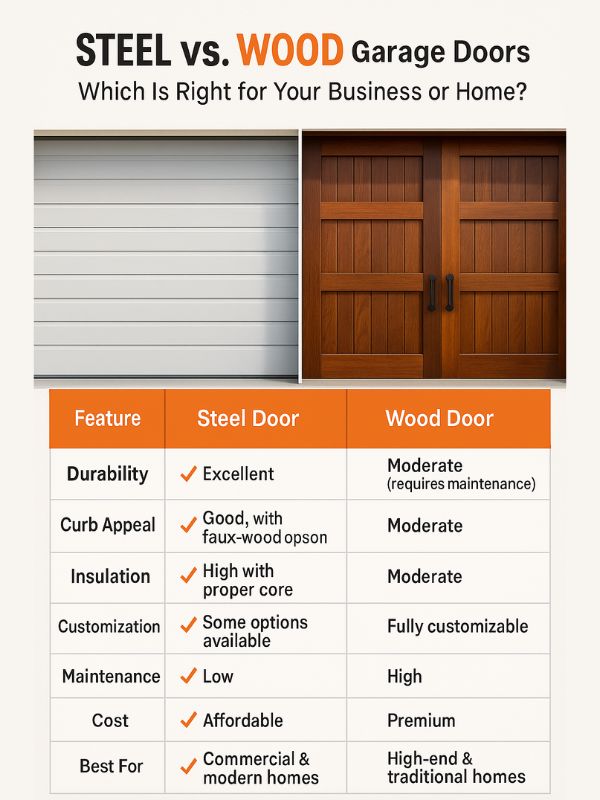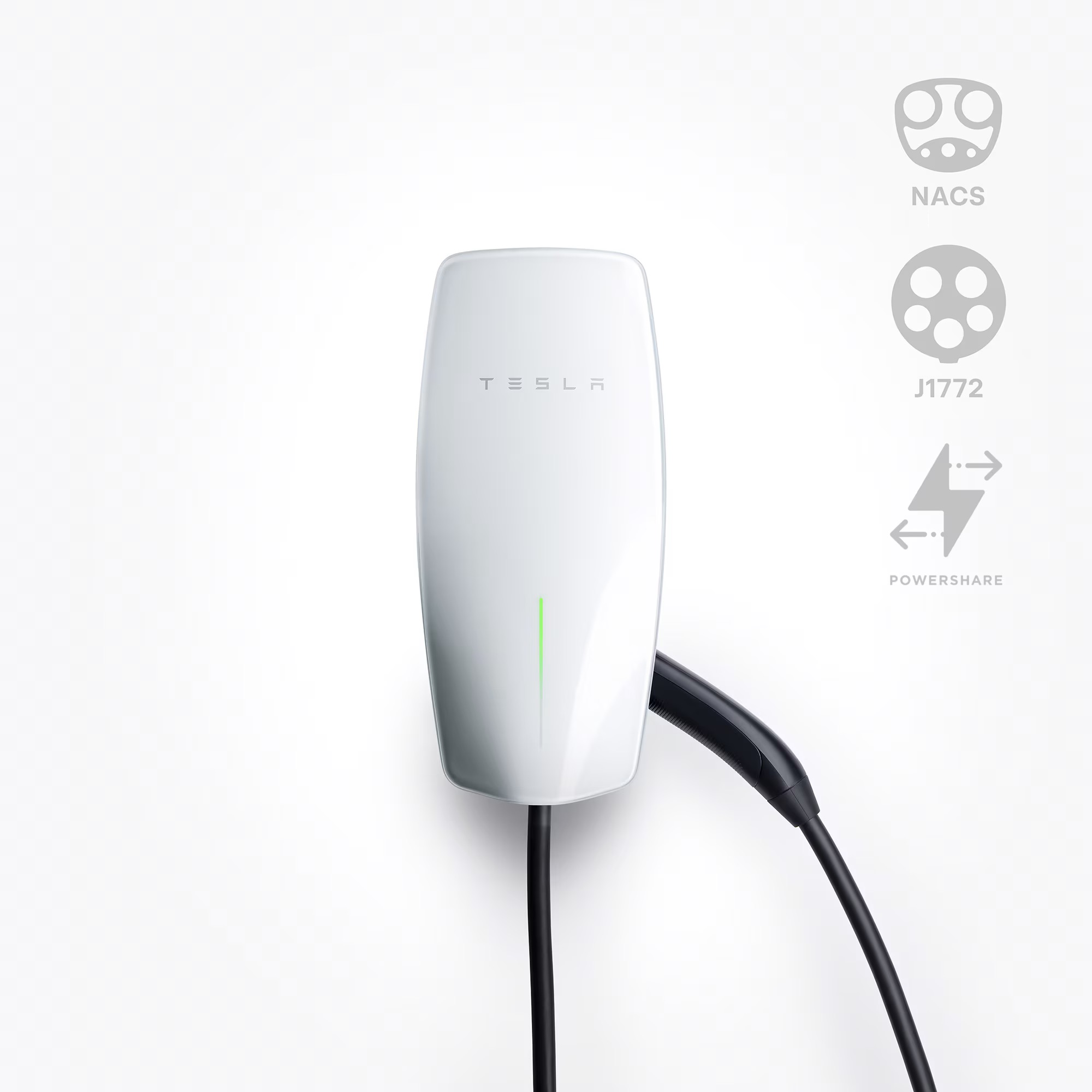How to Choose a Commercial Garage Door for Your Warehouse or Facility
Choosing the right commercial garage door for your warehouse or facility is about more than just aesthetics—it directly impacts your security, workflow, energy efficiency, and long-term maintenance costs.
With dozens of options available, understanding your specific needs can help you select the ideal door system that meets your building’s demands and complies with safety regulations.
This guide walks you through the most important factors to consider when selecting a commercial garage door, including door types, materials, insulation, automation, and project requirements.
Why Your Commercial Garage Door Choice Matters
The right garage door can make or break your operation—literally. From increasing energy efficiency to securing valuable inventory and improving traffic flow, investing in the correct solution for your facility isn’t just smart—it’s essential.
Whether you’re building new or upgrading an existing door, your choice should align with how your door’s size, features, and functionality affect daily operations and long-term performance.
1. Identify the Needs of Your Facility
Before choosing a door, assess how the door will be used daily. Ask yourself:
- How often will the door open and close?
- Will forklifts or large vehicles pass through?
- Is temperature control important?
- Do you need fire protection or security features?
Understanding how your team uses the space helps determine what garage door service features are essential.
2. Choose the Right Door Type
There are several commercial garage door types designed for specific applications:
✅ Sectional Doors
Made from horizontal panels that rise vertically and slide along the ceiling. Great for loading docks and general warehouse use.

✅ Rolling Steel Doors
Rolling steel doors are ideal for tight spaces, these fire-rated door options roll into a compact coil above the opening. Common in industrial or high-security applications.
✅ High-Speed Doors
Built for facilities with frequent access or high-traffic zones, these doors open and close quickly to reduce air loss and improve efficiency.
✅ Fire-Rated Doors
Required in certain zones for building code compliance. These fire resistant doors automatically close during emergencies to contain fire and smoke.
✅ Counter Shutters
Perfect for cafeterias, service counters, or reception areas. These smaller-scale doors provide security in compact areas.
3. Select the Right Material
Material affects everything from durability and maintenance to cost and fire resistance.
🧱 Steel Doors
Strong, durable, and often required for fire-rated and high-security applications. Available with insulated cores and heavy-duty finishes.
🌲 Wood Doors
Rare for warehouses but still used in some custom door applications for aesthetics. Not recommended for high-use or high-risk zones.

💨 Aluminum or Glass
Aluminum or glass garage doors are often used for modern storefronts or interior commercial spaces. Offers light and visibility but may not offer strong insulation.
Make sure the material aligns with your project requirements and daily usage patterns.
4. Consider Insulation and Energy Efficiency
If you operate in a climate-sensitive environment—or simply want to cut energy costs—choosing an insulated door with a high R-value can significantly improve your building’s energy efficiency.
Benefits of Insulated Garage Doors:
- Reduced heating and cooling costs
- Better temperature control in cold storage or food processing
- Quieter operation
- Improved durability
Double-check that the door’s insulation matches your region, usage, and the rest of your building envelope.
5. Match the Door’s Size to Your Opening
This sounds obvious, but many warehouse doors are custom size. You’ll want to:
- Measure both width and height accurately
- Factor in ceiling clearance and side room
- Ensure compatibility with dock equipment or vehicle clearance
Large facilities often need extra-wide openings or door systems with adjustable tracks or closing devices that can adapt to unique requirements.
6. Factor in Security and Safety Features
Security is a top concern for many warehouses and facilities. Consider doors that include:
- Solid core construction
- Reinforced locking mechanisms
- Integrated fire-rated features
- Remote access or smart lock integration
For safety, include photo eyes, manual release options, and audible alarms if needed. Many advanced systems can be integrated into your building’s overall access control or security network.
7. Understand Building Code Compliance
Every commercial door must meet certain building codes, and warehouses often have more stringent requirements.
Depending on your location and facility type, you may need:
- Fire-rated garage doors in high-risk zones
- Proper labeling from UL, FM, or Intertek
- Annual drop tests for fire doors
- Panic bars, door frames, and closers on pedestrian doors
Failing to meet code can result in costly violations—or worse, compromised safety during emergencies.

8. Think Long-Term: Maintenance and Repair
Commercial doors take a lot of abuse. Consider choosing doors that:
- Come with strong warranties
- Use common, easy-to-source parts
- Can be serviced by local garage door repair services
- Include automatic closing devices and smart diagnostics
Doors that require special tools or obscure parts may lead to longer downtimes and higher repair bills.
9. Weigh Your Budget Against Long-Term Value
While initial door installation cost is a key factor, don’t overlook the long-term savings offered by high-performance doors.
Ask yourself:
- How much downtime can I afford?
- Will a cheaper door require more frequent service?
- Is this door a temporary or permanent solution?
Also ask your installer: How much does it cost to install a commercial garage door with insulation, automation, or fire-rated features? A little more upfront could save a lot in the long run.
10. Work With a Qualified Garage Door Partner
Not all installers are qualified to assess your building’s usage, code needs, and technical specs. Make sure your provider:
- Offers commercial garage door service
- Has experience with door systems for warehouses or manufacturing
- Understands fire door requirements and testing
- Can service custom and solid wood doors, steel doors, or wrought iron styles
- Helps with code compliance and permitting
Final Thoughts
Choosing the right commercial garage door for your warehouse or facility takes more than measuring an opening and picking a style. It’s about making the smart choice for your workflow, compliance, and long-term investment.
Whether you need a fire-rated door, an insulated steel door, or a custom door system tailored to your operations, the right solution will improve safety, efficiency, and reliability.
Third Gen Garage Doors proudly helps businesses across the Denver metro area choose and install the perfect door for their warehouse, loading dock, or industrial facility.
From consultation to installation to long-term repair service, we’ve got you covered.






